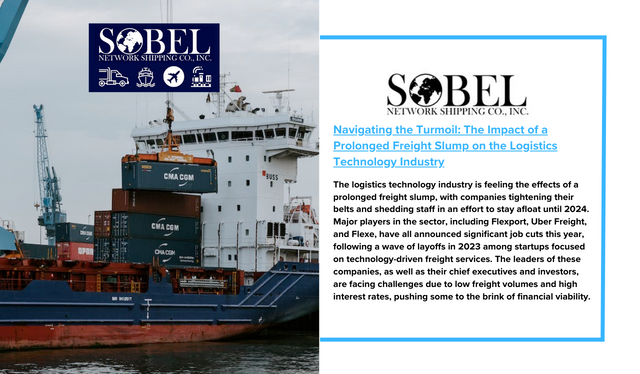The logistics technology industry is feeling the effects of a prolonged freight slump, with companies tightening their belts and shedding staff in an effort to stay afloat until 2024.
Major players in the sector, including Flexport, Uber Freight, and Flexe, have all announced significant job cuts this year, following a wave of layoffs in 2023 among startups focused on technology-driven freight services. The leaders of these companies, as well as their chief executives and investors, are facing challenges due to low freight volumes and high interest rates, pushing some to the brink of financial viability.
At Flexport, nearly 20% of the workforce is expected to be let go this year, which amounts to approximately 500 employees, according to a reliable source. This is the second round of major layoffs at the company in less than six months.
In the words of Larry Aschebrook, managing partner at growth-stage venture capital firm G Squared, “You need to basically hunker down and survive.” His firm has invested in Flexport and freight broker Transfix, which also laid off workers in 2023. One of G Squared’s portfolio companies, digital freight broker Convoy, was valued at $3.8 billion in 2022 but ultimately shut down in October 2023 due to excessive costs, including a large number of highly-paid software engineers.
According to John Anderson, an operating partner at private equity firm Greenbriar Equity Group, these startups have become bloated because they are building in anticipation of future demand. “That’s fine as long as someone keeps funding you on that prayer and that hope,” he said.
The recent job cuts in the startup sector mirror similar actions taken by traditional freight and technology companies. However, investors note that established companies have stronger financial positions, making them better equipped to weather the economic downturn.
Venture capital investments in supply chain technology startups plummeted from $5.2 billion in the fourth quarter of 2021 to just $780 million in the same period of 2023, according to PitchBook Data. With less funding available and revenue declining, startups have been forced to make difficult decisions and cut their workforce.
During the height of the Covid pandemic, logistics startups reached staggering valuations as a surge in consumer spending drove freight volumes and shipping rates to record levels. But as consumer spending on goods slowed in 2022 and freight volumes dropped, some of these companies struggled to stay afloat.
Flexe, a platform that connects businesses with shared warehousing space, has laid off a total of 230 workers in September 2023 and this month, representing 38% of its workforce. However, Karl Siebrecht, the company’s co-founder and CEO, remains optimistic, stating that Flexe has a “very significant cash balance” and plans to continue expanding.
A spokesperson for Uber Freight stated that the recent job cuts, which amount to less than 1% of the company’s workforce, are part of their ongoing growth strategy.
Despite the challenges, supply chain visibility startups such as Project44 and FourKites have found their services in high demand due to recent shipping disruptions in the Red Sea caused by Houthi rebels attacking commercial ships.
Jett McCandless, founder and CEO of Project44, stated that the incident in the Red Sea has actually been a “tailwind” for their business. The Chicago-based company, which has undergone two rounds of layoffs in 2023, has made adjustments to its software to provide customers with relevant information, such as delay schedules.
The pressure to cut costs is not only coming from investors, but also from customers. Matt Elenjickal, founder and CEO of FourKites, which provides freight tracking services for companies like Procter & Gamble and Kimberly-Clark, explains, “Fortune 500 companies want to work with financially stable companies.” This pressure has led to FourKites laying off 15% of its workforce, or 30 employees, last month after a similar round of layoffs in 2022. Elenjickal believes that the company will now be able to operate without incurring losses this year.
He also stated that the company’s goal is to go public, possibly in 2026, and that they cannot continue to rely on constant funding without any end in sight.


